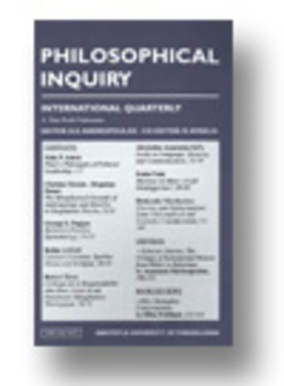Seneca on virtue as psychological therapy and the causes of passions
Part of : Philosophical inquiry ; Vol.39, No.2, 2015, pages 49-56
Issue:
Pages:
49-56
Author:
Abstract:
Even though he generally agrees with Chrysippus on the matter of the ontology of passions, Seneca differentiates mainly in his emphasis that passions are the reason why man leads an inauthentic, unhappy and undignified life. Although Seneca is a very orthodox Stoic, in most of the cases where his stoic credibility is challenged, he resorts to a therapy plan that exceeds the usual stoic strictness on the absoluteness of the status of the sage. In this scheme, the Roman philosopher employs practical techniques that refer to the ordinary man, the man who rationally desires to change his merely-being into well-being. This shift of focus is partially explained through the social orientation of the moral context: man is not alone while achieving his perfection of character; there are others who need to be helped, so that the pursuit of wisdom becomes a pananthropic effort, not an act of alienation. Since moral success is connected with the other person in such a manner, it is not a paradox that it needs to start from within, from the nucleus of personhood. The role of individuality is particularly stressed, especially on the premises that man first ought to make this constant and conscious effort to help himself, to cure his own soul, often with the aid of others who share the same path, before he attempts to be engaged in the therapy of the passions of others. Under this prism, the senecan proposal for the therapy of passions leads to a practical culmination where man is not only bound to achieve his ontological excellence but also to relieve his soul from the traumas of passions and to connect himself with the moral and existential safety that the presence of "recta ratio" guarantees.
Subject:
Subject (LC):
References (1):
- Cicero (1927), Tusculanae Disputationes. Translated by J. E. King, Harvard University Press, Cambridge- Massachusetts - London.Diogenes, Laertius (1925), Lives of Eminent Philosophers. Translated by R. D. Hicks, Vol. I-II, Harvard University Press, Cambridge- Massachusetts - London.Galen ( 1984), De Hippocratis etPlatonis Dogmatibus. Corpus Medicorum Graecorum, Akademie Verlag, Berlin.Gavaris, V. (1987), The Examination of the Idea of Spiritual Discipline in younger Seneca. Saripolos, Athens.Inwood, B. (1993), "Seneca and Psychological Dualism". In J. Brunschwig and M. Nussbaum (eds.), Passions and Perceptions, Cambridge University Press, Paris, 150-183.McDonnell, M. (2006), Roman Manliness. Virtus and the Roman Republic. Cambridge University Press, New York.Nussbaum, M. (1992), The Therapy of Desire: Theory and Practice in Hellenistic Ethics. Princeton University Press, Princeton.Reydams-Schills, G. (2005), The Roman Stoics: Self Responsibility and Affection. University of Chicago Press, Chicago.Seneca, L. A. (1935), Moral Essays. Translated by John W. Basore, Vol. I-III, Harvard University Press, Cambridge- Massachusetts - London.Seneca, L. A. (1962), Ad Lucilium Epistulae Morales. Translated by Richard Gummere, Vol. I-III, Harvard University Press, Cambridge- Massachusetts -London.Strange, S. K. (2004), "The Stoics on the Voluntariness of the Passion". In S. K. Strange et al, Stoicism. Traditions and Transformations. Cambridge University Press, Cambridge, 32-51.Voelke, A. J. (1965), "L'unité de l'âme dans l'ancien stoïcisme". In Studia Philosophica 25, 154-181.




